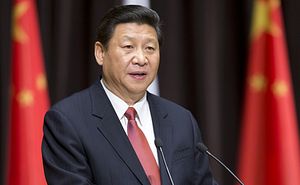A framework agreement for the operations of the Chinese-led Asian Infrastructure Investment Bank was officially signed in Beijing today, with representatives from the 57 founding members gathering for the ceremony. However, only 50 countries actually signed the agreement – seven (Denmark, Kuwait, Malaysia, the Netherlands, the Philippines, South Africa, and Thailand) have to get the AIIB charter formally passed through domestic processes before they can officially sign. Chinese media said the seven are expected to join by the end of the year (although things may be more complicated in the case of the Philippines).
The signing of the agreement came with new clarity on how AIIB capital and voting rights will be divvied up. As expected, China is the largest shareholder, accounting for 30.34 percent of AIIB shares. China is followed by India (8.52 percent), Russia (6.66 percent), Germany (4.57 percent), and South Korea (3.81 percent). Australia, France, Indonesia, Brazil, and the U.K. round out the top ten. As I previously noted (see: “A Big Step Forward for China’s AIIB”), 75 percent of shares were reserved for Asian members, giving them a proportionately larger say in bank governance.
More importantly, China will have 26.06 percent of voting rights – giving it an effective veto as major decisions require 75 percent approval. However, Chinese Vice Finance Minister Shi Yaobin told Xinhua that “China is not deliberately seeking a veto power.” China Daily previously reported that as other countries join (and current members’ voting rights decrease proportionately), China could naturally cede its veto — and would not deliberately seek to maintain it. In practice, it may not matter whether China has a singled-handed ability to veto, though; it’s likely that Beijing could convince enough partners to join it in blocking any potential changes it might find unappealing. That means China can balance defending its control over AIIB with the optics of giving up a veto.
China is hailing the bank as a win for the world, and for developing countries in particular, which have long seen efforts for a greater say in global governance come to naught. As one Xinhua commentary put it, “as the increasing importance of emerging markets changes the landscape of a global economic order that has long been dominated by advanced economies, they also want a new institution that best serves their own interests. The AIIB answers that call.” China sees the AIIB as the beginning of a new era, where developing countries begin to take their rightful place in global governance — either within or (if necessary) outside of existing global institutions.
President Xi Jinping, who oversaw the signing ceremony, called it a “historic step.” “The founding countries have reached a high-quality agreement today,” Xi said. “As long as all parties stick to the spirit of multilateral cooperation, we can make the AIIB a new platform that features openness, inclusiveness and mutual benefits, and contribute to Asian infrastructure development.”
The reference to the AIIB articles being a “high-quality agreement” hearkens back to early criticism from the United States and Japan, who raised concerns that the bank would not keep to high governance standards. Representatives from other developed countries in AIIB, including Australia and New Zealand, have proclaimed their satisfaction with the bank’s governance as laid out in the charter.
Most of all, Chinese pronouncements highlighted the extreme need for infrastructure funding. “[T]he bank will help meet the massive capital requirements of infrastructure projects worth trillions of dollars in the Asia-Pacific. No single institution could do this on its own,” Xinhua noted. The idea is that there is plenty of need to keep the World Bank, the Asian Development Bank, and AIIB occupied – they can cooperate rather than compete.
The ADB itself has estimated that between 2010 and 2020, Asia needs $8 trillion worth of investment in national infrastructure, and another $260 billion in regional infrastructure projects. “The required investment in regional infrastructure for pan-Asian connectivity would produce large real income gains of around $13 trillion for developing Asia during 2010–2020 and beyond,” the ADB noted. The same report argued that “an Asian infrastructure fund is needed to mobilize Asia and international funds” – China believes its AIIB can fulfill that function.
AIIB will be based in Beijing but use English as its operating language. It will be led by a president, to be chosen from among the Asian member countries via an “open, transparent, and excellent” selection process (according to the agreement signed Monday). The president will sit for five years, with the possibility of a second term. The AIIB will also be governed by a non-standing board of directors, which will convene as necessary to make major decisions.
The AIIB is expected to begin operations by the end of 2015.
































